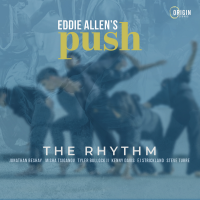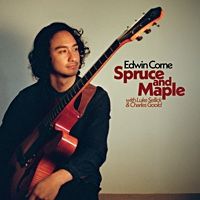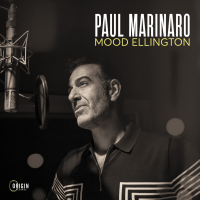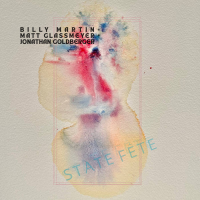Home » Jazz Articles » Multiple Reviews » Exotic Ivories: Hard Bop Piano and World Beat Rhythms
Exotic Ivories: Hard Bop Piano and World Beat Rhythms
Jazz piano and world music rhythm make an enchanting pair. With the popularization of world beat music, jazz musicians nurtured on straight-ahead precepts have incorporated instruments and musical concepts from other cultures into their art. Some, like saxophonist Sam Newsome on last year's release Global Unity, have exited traditional jazz entirely, adopting these international grooves wholesale. Others—clarinetist Don Byron, for instance, on his recent Your Are #6—have applied world rhythms in a mainstream context with varying degrees of success. Straight-ahead pianists Renee Rosnes and Michael Wolff catch the world beat wave on their respective latest efforts, Life On Earth and Intoxicate, and offer two syntheses.
Both Rosnes and Wolff hold impeccable straight-ahead credentials. After moving to New York from her native Canada in 1986, Rosnes honed her chops as a regular sideman with hard bop icons Joe Henderson, James Moody, J.J. Johnson, Bobby Hutcherson and Wayne Shorter. As a leader since the '90s, she's cut eight straight-ahead albums (including this most recent) for Blue Note. Wolff is perhaps best known as bandleader and musical director for Arsenio Hall's '90s late-night talk show and as husband to actress Polly Draper. Prior to realizing this commercial success, however, Wolff built a respectable career in mainstream jazz. He experienced his first call at 19, playing for vibraphonist Cal Tjader. From there he worked with heavy hitters like Cannonball Adderley and Sonny Rollins. And he has released a number of straight-ahead albums in his own right as a leader.
 Rosnes remains within a straight-ahead framework on Life On Earth. She elegantly insinuates world beat instruments into traditional jazz structures of rhythm, melody, improvisation and vamp to produce a distinct yet generically satisfying sound. The opening track, "Empress Afternoon," epitomizes the album's format: Zakir Hussain on tablas supplants the rhythm function held by traditional western skins and also takes a solo spot. After the abrupt shift from the melody, tablas comp heavily behind Rosnes' powerful, dark notes. The pairing of hard bop piano with Indian rhythm works well. But the real jewel in the crown is Hussain's improvisation. Following a brief reprise of the melody, he takes off totally unaccompanied, displaying some extended subcontinent soloing. Indian tabla extemporization framed within a mainstream jazz tune is just plain cool.
Rosnes remains within a straight-ahead framework on Life On Earth. She elegantly insinuates world beat instruments into traditional jazz structures of rhythm, melody, improvisation and vamp to produce a distinct yet generically satisfying sound. The opening track, "Empress Afternoon," epitomizes the album's format: Zakir Hussain on tablas supplants the rhythm function held by traditional western skins and also takes a solo spot. After the abrupt shift from the melody, tablas comp heavily behind Rosnes' powerful, dark notes. The pairing of hard bop piano with Indian rhythm works well. But the real jewel in the crown is Hussain's improvisation. Following a brief reprise of the melody, he takes off totally unaccompanied, displaying some extended subcontinent soloing. Indian tabla extemporization framed within a mainstream jazz tune is just plain cool. The subsequent tenor of the album reinforces the theme. Rosnes maintains the focus on world percussion on "Senegal Son." Despite the tune's title and Senegalese percussionist Mor Thiam's support on his native djembe, the real highlight of the piece is Steve Nelson's marimba work. Nelson and Shelley Brown on alto flute establish the bouncy and infectious melody, which paves the way for Nelson's resonating mallet improvisation. The primitive xylophone assumes the role that vibes might in a conventional setting and thereby offers a creative sound within a familiar structure. Similarly, on "The Call of Triton" Rosnes couches Steve Turre's echoing solo on musical seashells within a strongly articulated bass clarinet and flute theme.
Through unorthodox vamps and introductions Rosnes further synthesizes world music elements with mainstream formats. Till its closing lines, "Icelight" gives the impression of a traditional quartet arrangement of saxophone plus rhythm: Walt Weiskopf on tenor and Rosnes state the theme in unison; Weiskopf crams a flurry of burning notes into an engaging solo that exhibits bebop inflections; Rosnes morphs her scalar sounding improvisation into one extended, furious run up and down the keyboard; and Weiskopf and Rosnes reprise the theme. The restatement of the melody segues into the tune's notable feature—Native American singer Kevin Tarrant's vocal vamp.
"Hanuman," the Monkey God, reverses the tack. Rosnes opens the piece with a sample from the Ketjak Balinese Monkey Chant that suggests exotic grooves to follow—but the song bursts into a booming straight-ahead melody that features Conrad Herwig and Steve Turre on trombones and Douglas Purviance on bass trombone. Chris Potter's sturdy tenor initiates the solos. Rosnes follows and makes her own forceful and rhythmically fiery statement. The trombones reprise the theme and Potter makes a final comment that hints at free jazz inclinations. This opposite placement of world music elements on patently conventional jazz tunes characterizes Rosnes as a competent conceptualist.
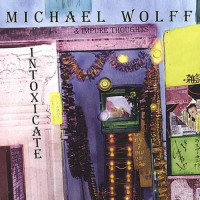 Intoxicate Michael Wolff's second endeavor with his current band, Impure Thoughts. The album picks up where the group's eponymous debut disc left off, continuing the integration of jazz and world music. Wolff provides a heterogeneous program: among a handful of his own compositions he sprinkles original treatments of Wayne Shorter, Lee Morgan, and Marvin Gaye tunes and even a remix by Master T. The common thread of Indian rhythms connects this varied playlist—Badal Roy's tablas imprint an entrancing groove on every song.
Intoxicate Michael Wolff's second endeavor with his current band, Impure Thoughts. The album picks up where the group's eponymous debut disc left off, continuing the integration of jazz and world music. Wolff provides a heterogeneous program: among a handful of his own compositions he sprinkles original treatments of Wayne Shorter, Lee Morgan, and Marvin Gaye tunes and even a remix by Master T. The common thread of Indian rhythms connects this varied playlist—Badal Roy's tablas imprint an entrancing groove on every song. In contrast to Life On Earth, Intoxicate isn't wedded to a formal straight-ahead structure but strives for a more commercially appealing sound. The world music vibe manifests itself primarily in rhythm and the jazz sensibility in improvisation, with both suspended in a colloid of heavy grooves and drone tone. The opening track, "Badd Al," demonstrates this inclination. As the song's title, a pun on Roy's name, suggests, tablas are central to the beat behind the song's groovy melody. Despite the intended focus on the tablas, Wolff is content—unlike Rosnes on "Empress Afternoon"—to relegate the Indian drums to a strictly rhythm role—he doesn't offer Roy the opportunity to solo. On tunes like "Bells" and "Cool," tablas dominate the opening lines that introduce the melody; usurp the rhythm function of conventional drums; and create the international vibe.
Wolff doesn't place a premium on extemporization on this album, choosing rather to accentuate grooves and drone instead. Listeners accustomed to jazz improvisation will not find the soloing entirely satisfying—Alex Foster on saxophone and Wolff never stretch out on any of the numbers. Foster oscillates between a mainstream sound and simulated Eastern grooves. On "Sexual Healing," the tempo picks up as Foster emits melodic bursts that really swing with the beat. His horn mimics the buzzing of a snake charmer's flute on the originals like "Badd Al" and "Kempta." Amidst the world music melodies and rhythm, Wolff opts to remain with a straight-ahead sound on his solos. For example, on "Badd Al" the bass cuts out the infectious riff to announce Wolff's in the pocket solo.
Wolff's engaging interpretation of the covers characterizes Intoxicate's approach to synthesizing world music and jazz. On Shorter's "Witchhunt," the heavy, tabla infused rhythm almost swallows the familiar melody. The song only maintains its link to its hard bop roots through the structure of improvisation: Foster blows a solo that flows with the funky rhythm; Wolff's manipulation of the ivories clearly references the melody. Similarly, the gritty, blues theme of Lee Morgan's "Sidewinder" mutates into an international beat, prime-time-television-soundtrack drone. Wolff's solo returns the listener to familiar territory. His single note flurries and light runs up the keyboard trill. He eschews chords and realizes a delicacy that contrasts with the tune's dense groove.
Life On Earth and Intoxicate apply world music sensibilities to hard bop, piano-led jazz. Rosnes showcases the improvisational potential of world beat instruments while Wolff opts to highlight their rhythmic and atmosphere-generating qualities. Both musicians meet the challenge of combining the disparate elements to create a compelling sound.
Tracks and Personnel
Album Title #1 Life On EarthTrack Listing: Empress Afternoon; Senegal Son; Ballad Of The Sad Young Men; Icelight; Gabriola Passage; The Quiet Earth; Hanuman; Nana; The Call Of Triton
Personnel: Renee Rosnes -piano; Walt Weiskopf -tenor sax, soprano sax; Chris Potter -tenor sax, bass clarinet; Conrad Herwig -trombone; Steve Turre -trombone, shells; Douglas Purviance -bass trombone; Shelley Brown -flute; Steve Nelson -marimba, vibes; Christian McBride -bass; John Patitucci -bass; Jeff Tain Watts -drums; Billy Drummond -drums; David Gilmore -acoustic guitar; Zakir Hussain -tabla; Mor Thiam -djembe, vocals; Kevin Tarrant -vocals; Duduka Da Fonseca -percussion; Laura Seaton, Laura Oatts -violins; Ralph Farris -viola; Erik Friedlander, Sachi Patitucci -cellos
Intoxicate
Track Listing: Badd Al; Witchhunt; Bells; Kempta; Sidewinder; Cool; Pandora's Box; Sexual Healing; Witchhunt (remix)
Personnel: Michael Wolff -piano; Alex Foster -saxophones; Badal Roy -tablas; Frank Colon -percussion; John B. Williams -upright electric bass; Victor Jones -drums; Charlie Hunter -8-string guitar on "Sexual Healing"
Tags
PREVIOUS / NEXT
Support All About Jazz
 All About Jazz has been a pillar of jazz since 1995, championing it as an art form and, more importantly, supporting the musicians who make it. Our enduring commitment has made "AAJ" one of the most culturally important websites of its kind, read by hundreds of thousands of fans, musicians and industry figures every month.
All About Jazz has been a pillar of jazz since 1995, championing it as an art form and, more importantly, supporting the musicians who make it. Our enduring commitment has made "AAJ" one of the most culturally important websites of its kind, read by hundreds of thousands of fans, musicians and industry figures every month.











